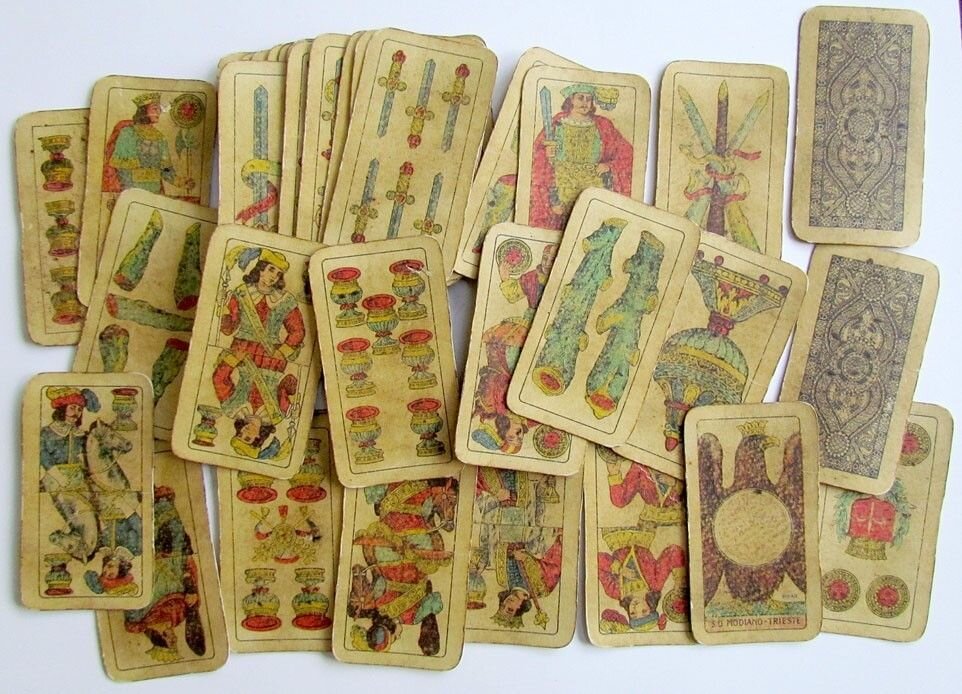Scopa: A Simple and Fun Italian Card Game
by Brian Alcamo
Italy is a land of many national pleasures. Limoncello, opera, and tiramisu are just three examples of the myriad Italian treasures. But the country has cultural mainstays that go beyond globally recognizable exports. Italy is home to more than just highly refined handicrafts. In fact, this bel paese is home to not just one, but three, national card games. While they might not evoke the same cultural reverie as Vivaldi’s Four Seasons, giochi di carte (card games) have sustained their presence in Italy through the centuries.
Card games are a big part of Italian culture, and they’re a great way to spend more time around the dinner table after the eating is over. A few years ago, I was lucky enough to spend an evening with a friend’s host family in Florence. We played Scopa, an Italian card game, after dinner and before dessert. By the end of playing, my Italian was way better than it was during the meal. Without food in our mouths, we were able to have a more fulfilling conversation that wasn’t happening in between bouts of chewing.
Scopa, Italian for “broom,” is a fishing-style card game that involves “capturing” cards from the table by matching table cards with the cards in your hand. Along with Briscola and Tressette, Scopa is an Italian card classic. The game is fast-paced, easy to learn, and hard to master. It makes for a perfect night of relaxing with friends and family around a table. Read on to learn more!
Italian Decks of Cards
Before you play Scopa, you have to make sure you have the right deck of cards. Decks of cards, or mazzi di carte, are a little bit different in Italy. For starters, these decks typically only have 40 cards. They eschew the 11, 12, and 13 values of Jack, Queen, and King for suits that end at 10.
Speaking of suits, very few Italian decks of cards use suits that are “Italian” in origin. Most in the North use French suits, and most in the South use Spanish suits. Italian suits are only prominent in the Northeast of the country around Veneto. In a typical 40-card Southern Italian deck: 4 suits: spade (swords), coppe (cups), ori/denari (coins), and bastoni (batons). Italian and Spanish suited share the same names, but use different pictures. Each region uses its own special set of cards.
Your cards probably won’t be this antique, but it’s worth aspiring to this level of authenticity anyway.
In cities north of and including Florence, most players use French cards. French cards are the 52-deck playing cards that most Americans and Brits are used to using. To adhere to the game play of Italian card games, players remove 3 cards from each suit, paring the 52-card deck down to a 40-card one. The Italian names of French suits are: Cuori (Hearts), Quadri (Diamonds, directly translated as “squares”), Fiori (Clubs directly translated as “flowers”), and Picche (Spades, literally "Pikes").
Unless you own an Italian deck of cards already, you’ll probably have to take out cards from a pack you already own. Once you’ve gotten yourself a Scopa-appropriate deck, it’s time to play!
Playing
Scopa is played for points. At the beginning of each game, players must agree on the winning number of points. A common goal score is 21.
To start, the dealer gives each player 3 cards (face-down) and places 4 cards (face-up) in the middle. Players try to capture cards from the face-up cards in the middle. They can either make a direct match, or (even better) match the value of one of their cards with the sum of multiple cards on the table. For example, if there are two cards on the table that add up to 8, and a player has an 8, that player can take both cards to create a match.
If you take all 4 cards on your turn, congratulations! You get 1 point for a successful scopa. Once everyone runs out of cards, the dealer deals players three new ones. A hand ends when the deck of cards runs out. This is when you score points.
Don’t be fooled by the game’s simple rules! Things can get competitive.
Scoring
1 point for each scopa
The player with the most cards gets 1 point. In the case of a tie, no one gets points.
The player with the most diamond (or coin) cards gets 1 point. In the case of a tie, no one gets points.
The player with the 7 of diamonds (Il Settebello) gets 1 point. In the case of a tie, no one gets points.
The player with the best primiera (prime) scores 1 point. A primiera is a set of 4 cards, one from each suit. If you don’t have one card from each suit, you’re not eligible to score a primiera. A primiera can be scored in multiple ways. Two common ways are whoever has the most 7s and who has the highest score based on a hard-to-remember chart that you can find here.
If no one has enough points to win, gameplay continues, and the deck is shuffled and dealt again. Play until one player has enough points to score.
Play With Friends!
Scopa is a fun and easy-to-learn card game that will keep you and your friends up into the wee hours of the night. Modify the rules as you see fit, and maybe even buy one of those beautiful Italian decks of cards to upgrade your game. Don’t forget to practice your Italian around the table as you play!
What’s your favorite card game? Comment below, and share this post with a friend.
(Thumbnail photo by Inês Ferreira)

